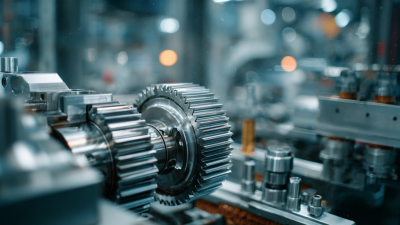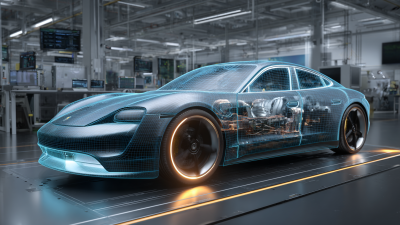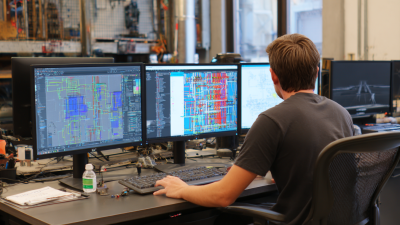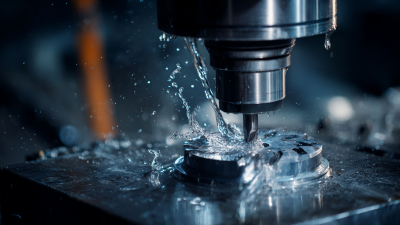Exploring the Future of Automation in Mechanical Engineering Innovations
The landscape of mechanical engineering is undergoing a profound transformation, propelled by the advent of automation. As industries strive for greater efficiency and competitiveness, "automation mechanical engineering" is becoming a pivotal focus, reshaping traditional practices and workflows. According to a report from the International Federation of Robotics, the global market for industrial robots is projected to reach over $70 billion by 2027, a clear indication of the growing reliance on automation in manufacturing processes.
Furthermore, McKinsey estimates that by 2030, up to 800 million jobs worldwide could be displaced by automation, yet this shift also presents opportunities for highly skilled roles in engineering and automation technology. The integration of advanced robotics, artificial intelligence, and the Internet of Things (IoT) in mechanical engineering heralds a new era where precision and productivity are enhanced, reducing costs and error margins. As we delve into the top innovations defining this field, it is essential to recognize how automation is not merely an add-on but a fundamental change driving the future of mechanical engineering.

The Impact of AI on Mechanical Engineering Automation
The integration of artificial intelligence (AI) into mechanical engineering is revolutionizing the field of automation, fundamentally altering how industries operate. According to a recent report by McKinsey, up to 61% of engineering tasks could be automated by 2030, driven largely by advancements in AI technologies. This shift not only enhances efficiency but also empowers engineers to focus on more complex problem-solving tasks, thereby increasing innovation potential.
Moreover, the application of AI in predictive maintenance is proving to be a game changer. A study by the World Economic Forum suggests that predictive maintenance can reduce maintenance costs by up to 30% and increase equipment availability by around 10%. By leveraging AI algorithms that analyze data from sensors and machinery, companies can prevent downtimes and optimize production processes, which significantly contributes to boosting overall productivity in mechanical engineering sectors. As we move towards a more automated future, the reliance on AI to streamline operations and improve decision-making will be paramount.
Emerging Technologies Shaping the Future of Mechanical Engineering
Emerging technologies are significantly transforming the landscape of mechanical engineering, driving innovations that promise to enhance efficiency and sustainability. One of the most impactful developments is the integration of artificial intelligence and machine learning into design and manufacturing processes. These technologies enable engineers to simulate and optimize designs in real-time, predicting performance and identifying potential issues before physical prototypes are even created. This not only accelerates the product development cycle but also reduces material waste, fostering a more eco-friendly approach to engineering.
Another transformative technology is the Internet of Things (IoT), which connects mechanical systems and devices, allowing for seamless data exchange and monitoring. By leveraging IoT, engineers can create smart systems that gather and analyze data in real-time, improving maintenance schedules and operational efficiency. Furthermore, advancements in robotics and automation are enhancing manufacturing capabilities, facilitating processes such as precision assembly and quality control with enhanced accuracy and speed. As these technologies continue to evolve, they will undoubtedly shape the future of mechanical engineering, paving the way for innovative solutions that meet the demands of a rapidly changing world.
Integrating Robotics into Mechanical Engineering Practices
The integration of robotics into mechanical engineering practices is reshaping the landscape of the industry, driving efficiency and innovation. According to a report by the International Federation of Robotics (IFR), the global stock of operational industrial robots reached approximately 2.8 million units in 2020, reflecting a 12% increase from the previous year. This surge emphasizes the growing reliance on automation technology in manufacturing environments, where robots are not just supplementing human labor but are becoming integral to production processes.
The World Economic Forum highlights that by 2025, automation and robotics are predicted to displace around 85 million jobs globally, while creating 97 million new roles that require a different skill set. As mechanical engineers increasingly collaborate with robotic systems, they are tasked with designing smart machines that enhance productivity and precision. The incorporation of AI and machine learning into mechanical automation is not only transforming workflow but also enabling real-time data analysis, allowing engineers to anticipate issues and optimize operations efficiently.
This shift towards robotics in mechanical engineering practices marks a significant evolution in how industries will operate in the coming years.
Challenges and Solutions in Automating Mechanical Processes
The automation of mechanical engineering processes is gaining traction, yet it is not without its challenges. A recent report by McKinsey & Company highlights that up to 45% of tasks in mechanical engineering could be automated by 2030, yet successful implementation requires a clear strategy to address potential barriers. Engineers face issues ranging from workforce skills gaps to resistance in adopting new technologies. According to the World Economic Forum, 85 million jobs may be displaced by automation, emphasizing the necessity for retraining programs that can equip employees with the skills needed to thrive in an increasingly automated environment.
Moreover, companies need to navigate the complexity of integrating advanced technologies like AI and IoT into existing frameworks. A study published in the Journal of Mechanical Engineering Science indicates about 62% of organizations fail to achieve automation goals due to inadequate technology alignment and infrastructure. To counter this trend, businesses should invest in modular automation solutions that allow for gradual implementation and scalability. By fostering a culture of continuous learning and enhancing technological readiness, mechanical engineering firms can effectively overcome these challenges and harness the full potential of automation.
Future Career Paths in Automated Mechanical Engineering Fields
The field of automated mechanical engineering is rapidly evolving, presenting numerous career opportunities for aspiring engineers. According to a report from the International Federation of Robotics, the global demand for industrial robots is expected to reach over 4 million units by 2025, signifying a robust growth trajectory. This surge in automation is not merely a trend but a necessity driven by the increasing need for efficiency and precision in manufacturing processes. Consequently, professionals with expertise in robotics, automation, and advanced manufacturing technologies are becoming invaluable assets to industries worldwide.
To thrive in these automated environments, engineers must equip themselves with a diverse skill set. Specializations in areas such as mechatronics, data analytics, and artificial intelligence will be critical. The Bureau of Labor Statistics projects that employment for mechanical engineers will grow by 4% from 2019 to 2029, with automated systems playing a pivotal role in this expansion. Graduates who embrace automation technologies will find themselves better positioned to take advantage of emerging roles, including automation engineers, systems integrators, and machine learning specialists, all essential for driving innovation in mechanical engineering.
Future Career Paths in Automated Mechanical Engineering
Related Posts
-

What is the Impact of Mechanical and Electrical Engineering on Modern Industries
-

Exploring Trends in Mechanical and Electrical Engineering at the 138th Canton Fair 2025 in China
-

Ultimate Guide to Mastering Automotive Mechanical Engineering for Future Innovators
-

Exploring the Essentials of Auto Mechanical Engineering Processes
-

Why Engineering Solutions Are Vital for Reducing Project Costs by Up to 30 Percent
-

Revolutionizing Mechanical Manufacturing: Innovations Driving Efficiency and Quality in Production
